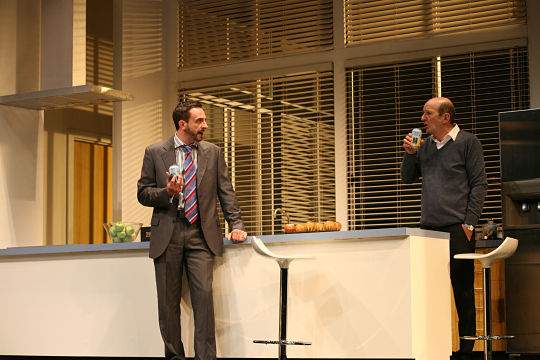The Grenade
Tony McNamara’s new play The Grenade is well paced, competently acted and funny at times, but it’s hard to get too excited about a show so keen to diffuse its own narrative tension. Ostensibly about the paranoia that ensues when political analyst and family man Busby McTavish (Gary McDonald) finds a hand grenade left in […]
Overview
Tony McNamara's new play The Grenade is well paced, competently acted and funny at times, but it's hard to get too excited about a show so keen to diffuse its own narrative tension.
Ostensibly about the paranoia that ensues when political analyst and family man Busby McTavish (Gary McDonald) finds a hand grenade left in his living room, The Grenade never makes any bones about its true focus: McTavish's angst over the potential sexual awakenings of his wife and daughter. And in that respect, the basic setup is pretty compelling. Busby's first wife cheated on him repeatedly a humiliation the play goes to some lengths to emphasise and his subsequent marriage to a ex-nun Sally (Belinda Bromilow) and encouragement of his teenage daughter's (Eloise Mignon) jaunt down the path of quirky, sexless nerddom both smack of pain repressed rather than healed. Enter suitors for both women and their evident reciprocity, and it seems like only a matter of time before something has to give and Busby explodes. Indeed, if the central metaphor somehow passes you by, there it is on the show's poster: McDonald's head superimposed on a shrapnel pineapple.
However, despite establishing a central conflict ripe for exploring ideas of fidelity, betrayal and possessiveness, McNamara does almost nothing with the premise. It's not so much that Busby's paranoia is played for laughs (this is a farce, after all) but that those laughs are overwhelmingly lazy, throwaway gags that swamp any humour the show could extract from the concerns it has created for its characters. There is some incisive stuff about the minutiae of failed relationships and the consequences of desire but it is immediately smoothed away with a thick layer of unrelated, inconsequential gags rather than building into something genuinely funny or cathartic. This kills what tension the play does build up, deflating its humour and robbing the audience of any investment in the characters. No-one's suggesting that theatre dealing with "weighty" themes has to itself be heavy going, and there's absolutely nothing wrong with inconsequential comedy, but putting the effort in to create an effective premise and not allowing it to play out comes across as somewhat wasteful in the end.





